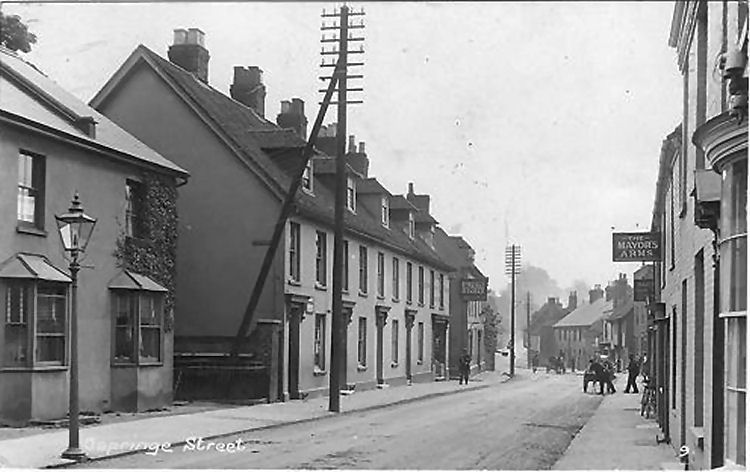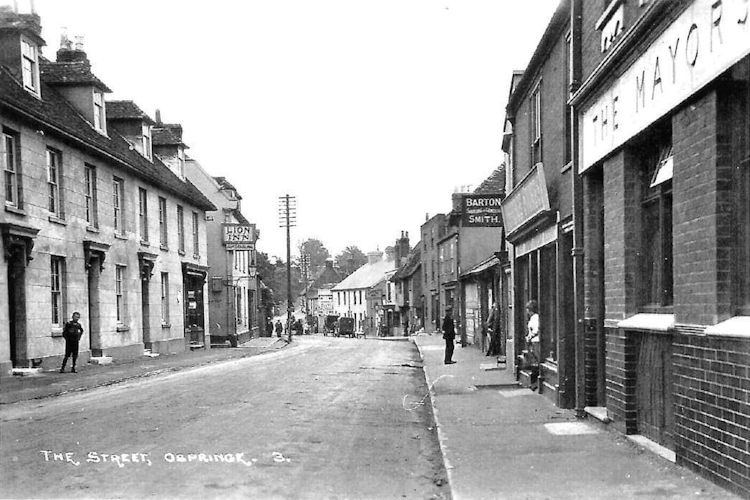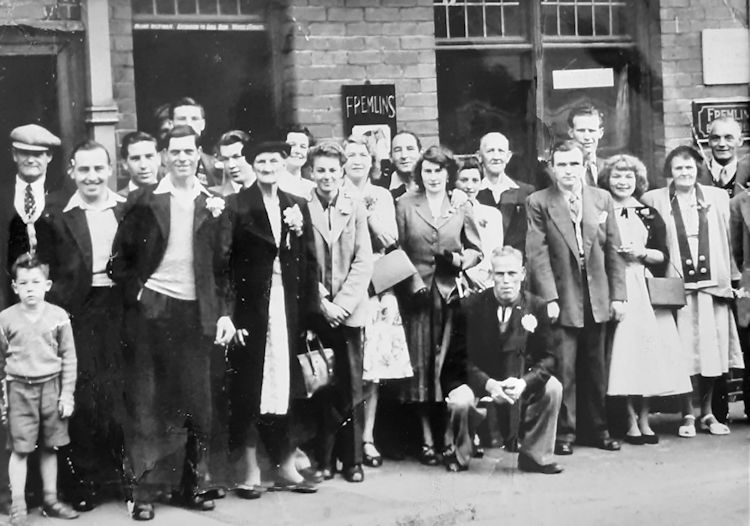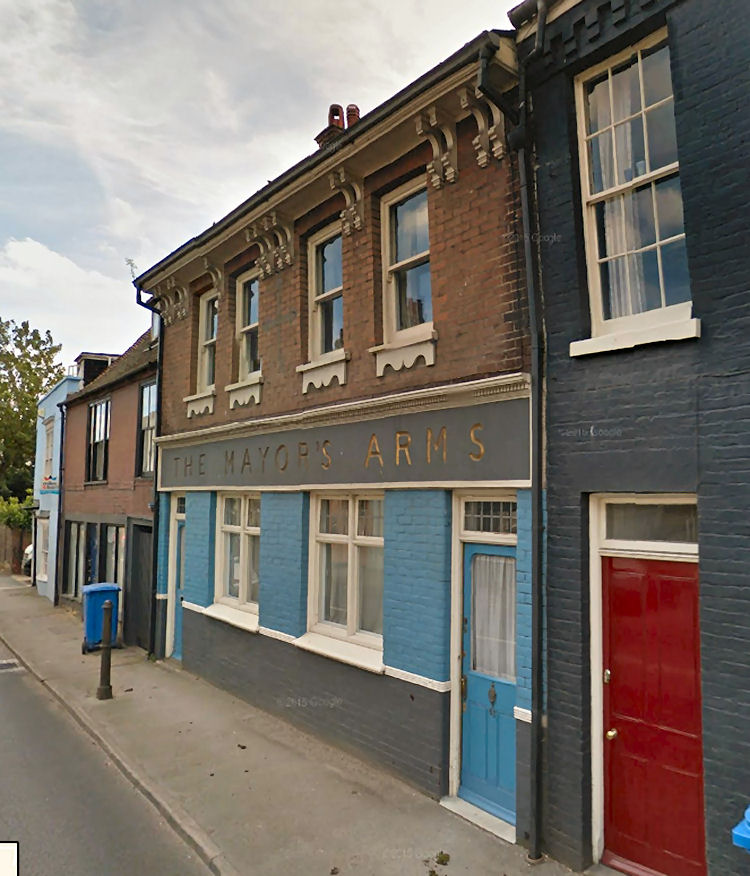|
63 Ospringe Street
Ospringe

Above postcard 1915. Kindly sent by Rory Kehoe. |

Above postcard, date unknown. |

Regulars on a trip to Hastings, photo includes Mrs. Gammon, Mr. & Mrs.
Stockwell, Ernie Shepherd, Babs & Joe Chislett, and George & Sylvia
Holbrook. Circa 1950. |

Above Google image August 2015. |
|
Whitstable Times and Herne Bay Herald 20 August 1887.
FAVERSHAM. FALL FROM A TRAIN.
Douglas Hills, a boy about 12 years of age, son of Mr. Hills, landlord
at the "Mayor's Arms" Ospringe, met with a serious mishap on Wednesday
last. It appears that he left Faversham for Whitstable by the 2.20
train, and shortly afterwards he was found by a ganger named Rains,
lying, in an unconscious state, in the sixfoot between the two lines
of rails at Graveney. How he came there is not certain, for at the time
of writing he was not in a condition to give any account of the
accident. That he fell out of the carriage whilst the train was
travelling there is no doubt, but whether he opened the door himself, or
it had been inadvertently left unfastened, is not known. When found he
was bleeding from the head, and had every appearance of having sustained
very serious injuries. Raine stopped the 1.15 train from Ramsgate and
sent him to Faversham in charge of the guard. On his arrival here Mr.
Goymer, the station master, sent for Dr. Gange, but he was not at home.
Meanwhile, however, it was, ascertained who the lad was, and Mr. Goymer
deemed it expedient to send him to his home without delay. A conveyance
was accordingly procured, and he was taken to Ospringe. His parents
immediately sent for Dr. Lyddon, who promptly attended, and upon
examination it was found that the unfortunate boy was suffering from
concussion of the brain, and that his head, face, and hands were badly
cut. It is also feared that the fall resulted in spinal injury. Dr.
Lyddon visited him a second time later in the day, when he was still
insensible. On Thursday, when the doctor paid his third visit, the lad
was beginning to show signs of returning consciousness, and he is now
going on as favourably as can be expected, though a considerable time
must, it is feared, elapse before he recovers from the effects of the
injuries. We may add that on the arrival of the train at Whitstable the
boy's hat and umbrella were found in an unoccupied compartment of a
third class carriage, the door of which was open.
|
|
Canterbury Journal, Kentish Times and Farmers' Gazette, Saturday 15 September 1894.
SHOCKING NEGLECT OF CHILDREN.
John Shepherd, labourer, of Whiting's Square, Ospringe, and Ann
Shepherd, his wife, were summoned for wilfully neglecting four of their
children, viz., Walter, aged 10 years; Louisa, 7; John, 5; and George,
4.
Mr. F. Johnson appeared to prosecute on behalf of the National Society
for the Prevention of Cruelty to Children.
Both defendants pleaded not guilty.
Mr. Johnson detailed the facts of the case, which were afterwards
brought out in evidence. He said he wished to press the charge very
strongly against the woman, so as it might be a lesson to neglecting
mothers in the future, but did not think it necessary to press so
heavily against the man. He characterised the case as a dreadful one,
and he did not believe that people had any idea that such a horrible
state of things existed so near their Town Hall.
Inspector John J. Browne, N.S.P.C.C., stationed at Canterbury, stated
that on the 28th of August last, he visited the house in which
defendants lived, and for which they paid 2s. 6d. a week. The male
defendant was employed at the Powder Works, and earned 15s. a week; he
had a son, who earned 7s. a week and there had been a step son lodging
with the family, paying 10s. a week. Witness found that the house had
but little furniture in it, the kitchen contained a table and three
chairs. There were three wooden bedsteads and one small cot in the
house. On the beds were mattresses, made of sacking, stuffed with chaff,
and three were alive with fleas. The only bed covering he could find was
a sheet hanging on a line, and an old coat. The stench in the house was
disgraceful, and made him vomit. When he came out he was alive with
fleas, and the woman asked him if he would like a brush to brush them
off. In the whole of his experience he had never seen a house in such as
beastly state. He saw the four children, who were fairly well nourished,
but their clothing was dilapidated. The girl's head was full of vermin,
and when he touched her hair with his stick they dropped on to the
floor. The three other children's heads were also full of parasites. He
examined the body of the boy Walter, and it had the appearance of not
having been washed for months. The bodies of the other children were
covered with scratches, as if they had been irritated. He asked the
mother if there was any special reason why the children could be in the
condition he found them, and she replied that she "did not know." He
waited to see the father, and asked him if he knew of the children's
state, and he answered "I know the house was dirty, but did not know the
children were so bad."
Instructing Constable Barnard, who visited the house with Inspector
Browne, gave corroborative evidence.
Elizabeth Fuller, house-keeper to Mr. Hills, of the "Mayor's Arms," gave
evidence that the defendant's spent at her master's house, on an
average, 3s. 7 1/2d. per week for beer.
Mr. Henry Etherington, agent for the house in which Shepherd and his
wife live, stated that he had had occasion to speak to the defendant as
to the dirty condition of the outside of their house.
Dr. C. J. Evars, Faversham, stated that on the 20th August, at the
request of Inspector Browne, he examined the four children. He found
them fairly well nourished but very dirty. Their hair was full of
parasites, more especially the girl's. Their bodies were covered with
marks of bites of vermin, and of irritation and scratching. The clothing
was old, but not insufficient. The room in which the children slept was
certainly not fit for human habitation. The bedding was torn and unfit
to lie upon. Constantly sleeping in the room would be likely to injure
the health of the children. Living under such conditions, he should not
be surprised to hear that another of defendant’s children was in
Canterbury Hospital suffering from consumption.
The male defendant had nothing to say in defence, while his wife
admitted that she knew the children were dirty, but asked not to be
dealt with severely.
The magistrates retired to consider their decision, and on returning
into Court the Chairman, who was greatly moved, and spoke at times with
difficulty, said the case was an important one, as it was the first of
the kind that had been brought before this Bench. They had considered
their decision in private, as they felt certain that now the movement
had been started it would be to a great extent be carried out. He would,
however, suggest to the Society in future to use extreme caution, ad not
follow cases too strictly or too closely, or no doubt there would arise
a certain amount of feeling against the officers, and make the Society
less beneficial than it otherwise would be. In the punishment they had
decided to inflict, persons must not think that the magistrates had gone
to the full extent of their power in such cases. Before mentioning what
the punishment was, he wished to express his deep regret that such a sad
state of things should exist in an English household, where it was
supposed that whatever failings a mother might have she would attend to
the health of her children. It did seem a very sad thing that these
children should not have had the attention which even the idlest of
mothers might be expected to bestow. Looking at the fact that, in the
present case, there was not the actual element of cruelty, the woman
would be sentenced to three weeks' imprisonment. With regard to the man,
he would be fined 10s., or seven days' imprisonment, and in order not to
press too much upon his wages the costs would be remitted.
|
|
Dover Express, Friday 09 February 1906.
LYMINGE. LICENCES OBJECTED TO.
The Faversham County Bench of Magistrates gave notice at their meeting
on Thursday that they should object to the renewal of the following
licenses:- The "Dolphin", "Three Squirrels," the "Ship" ale houses at Boughton; the
"Swan" ale house at Lynsted; the "Crown" ale house and the "Mayor's
Arms" beer-houses at Ospringe; the "Rose" beer-house at Teynham; the
"Scots Greys" beer house at Throwley; and the beer off-license held by
Mr. Philpott at Davington.
|
|
Whitstable Times and Herne Bay Herald 22 April 1933.
Mr. and Mrs. Herbert Carey, of the "Mayor's Arms," Ospringe, celebrated
their golden wedding on Wednesday in last week. Mr. Carey, who is 71, is
a native of Iden, Rye, and Mrs. Carey, who is 73 belongs to Whitcombe,
Dorset, where they were married in 1883 by the Rev. W. L. Barnes, who
was known as the Dorset poet. For twelve years they carried on a general
business at Gillingham, and in 1913 they came to Ospringe and took the
"Mayor's Arms," which during their tenancy was entirely rebuilt. In 1928
Mr. Carey retired and his eldest son, Mr. Ernest Carey, took over the
house. Their second son, Sidney, is a draftsman at the Admiralty, and
they also have two daughters. Their grandchildren number seven and there
are two great grandchildren. Mr. and Mrs. Carey celebrated their
fiftieth anniversary of their marriage by a wedding breakfast to which
sixteen sat down.
|
|
Sevenoaks Chronicle and Kentish Advertiser 11 February 1949.
Alfred Worster, "Bottle House," Penshurst who
asked for a full licence, had his application refused pending
arrangements for re-building.
|
LICENSEE LIST
HILLS Horace 1887-Sept/97+ (also carpenter and wheelwright aged 52 in 1891 ) )
HILLS Alice Sept/1897+

HILLS Edwin 1901+ (age 63 in 1901 ) )
HILLS Alice 1911-13+ (widow age 62 in 1911 ) )
CAREY Herbert 1913-Aug/28

CAREY Ernest Herbert (son) Aug/1928-33+

WALKER C H 1938+
SIMMONS Ernest 1939+ (age 49 in 1939)
WORSTER Alfred 1949+
https://pubwiki.co.uk/MayorsArms.shtml
http://www.closedpubs.co.uk/mayorsarms.html
 Whitstable Times
and Herne Bay Herald Whitstable Times
and Herne Bay Herald
 Census Census
|



